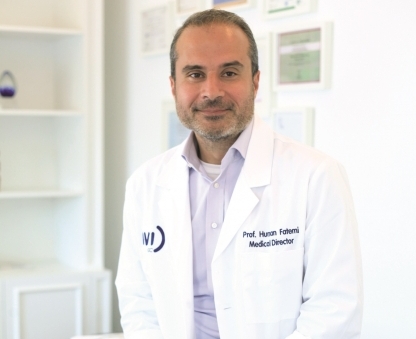
Consanguineous couples (married to first- or second-degree relatives) are major cause of high infertility in the Gulf, reveals new study
A groundbreaking medical study published by Professor Dr Human Mousavi Fatemi, Medical Director, IVI Fertility Middle East, has revealed that consanguineous couples (those marrying first- or second-degree relatives) are a major cause of a high infertility in the Gulf. The study further highlights that there are differences in treating GCC patients, compared to western patients, due to cultural and social issues.
This medical study is of great significance not only in the Gulf but also globally, since over 20% of children have consanguineous parents. It is the first time that these findings are analysed and presented to the scientific and medical communities worldwide and in the Middle East. The results of the study are extremely valuable for public health and a point of reference for many IVF doctors trying to treat fertility cases in the Gulf.
According to Dr Fatemi, there are unique and specific factors leading to infertility - social, and cultural, which are very different from western countries. Four of these factors that have significant impact on fertility in GCC population are: higher prevalence of consanguinity, in addition to Vitamin D deficiency, obesity and the desire to have larger families.
According to the study, parental consanguinity has been associated with both male and female infertility in multiple cases. In females, it prematurely reduces the ovarian reserve i.e. the bank of fertile eggs in women. Amongst males, it causes chromosome Y abnormalities, leading to genetic sperm defects.
“Today, infertility is globally acknowledged to be a major health problem. It is estimated that infertility affects 15% of the global population of reproductive age, but this percentage is even higher in the Gulf,” added Dr Fatemi.
“It was proven that by the age of 20, women born of consanguineous parents have an extremely low ovarian reserve, which is normally found in women from the age of 40,” explained Dr Human Fatemi.
“Consanguineous parents also have the risk of having a baby with genetic disorders. We at IVI Fertility, exclusively in the Middle East, offer a highly advanced genetic test, the Carrier Genetic Test (CGT). It is a simple blood test that is carried out when planning a family to prevent the risk of having a baby with genetic disorders. The CGT is highly recommended to all couples who are attempting a pregnancy by natural or IVF means,” added Dr Faterni.
Dr Human Fatemi recommends genetic testing for carriers regardless of pregnancy occurring naturally or through IVF, given the fact that a large percentage of people in the GCC are prone to genetic abnormalities. Generally, parents only realize they are carriers of serious genetic disorders after an affected child is born. Genetic disorders can't be cured, but they can be prevented. With this test, couples can be assured of a healthy pregnancy. If both partners test positive in a Carrier Genetic Test with the same gene mutation, the recommendation is to undertake an IVF procedure and eliminate a genetically effected embryo through PGS screening.
“Healthy embryos have an enhanced chance of a successful pregnancy and a healthy baby”, says Dr Fatemi.
IVI Fertility’s deep understanding of region-specific causes and use of advanced methodologies in treating infertility have enabled its Abu Dhabi centre to achieve a pregnancy rate of over 70%.
IVI Fertility, headquartered in Spain, is a world leader in infertility treatments with 50 clinics worldwide and a success rate of more than 120,000 babies across the globe. It has forayed into the GCC with its first clinic in Abu Dhabi, with three more to follow soon. IVI Middle East Fertility Clinic provides a comprehensive range of infertility services using advanced technology and state-of-the-art equipment under the care of an experienced team headed by Dr. Human M. Fatemi.


























